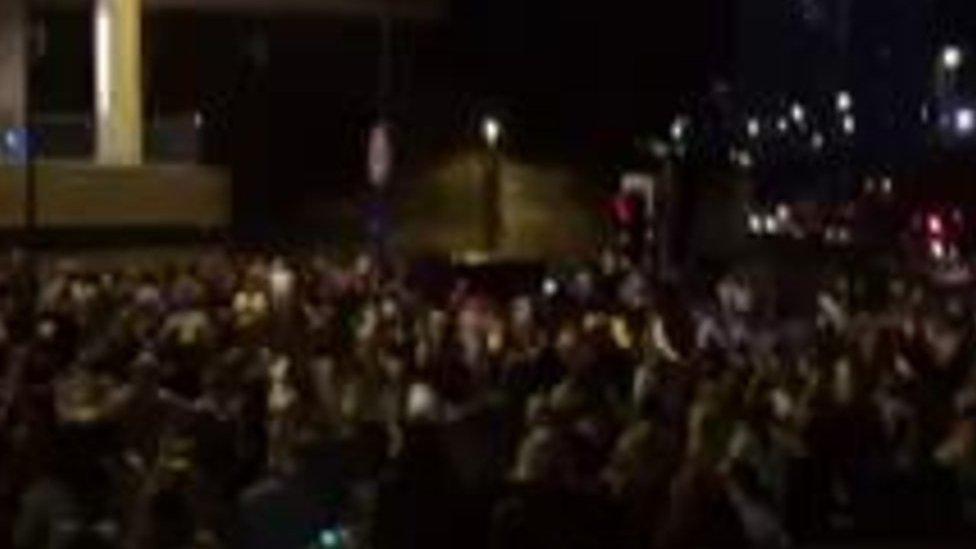Manchester attack: More PSNI patrols as threat critical
- Published
PSNI chief says he faced 'no political pressure' over military support
Police in Northern Ireland are to deploy extra officers at key sites as part of a UK-wide security response to the Manchester bombing.
Chief Constable George Hamilton said the government's decision to raise the terror threat level to "critical" also applies to Northern Ireland.
But Operation Temperer - a military deployment in response to the attack - does not apply to Northern Ireland.
Mr Hamilton said he did not feel it was necessary to ask for military support.
He pointed out that the Police Service of Northern Ireland (PSNI) currently has almost 7,000 officers who, unlike their counterparts in the rest of the UK, are all routinely armed.
The UK terror threat level was raised to its highest level of "critical" on Tuesday night, following the attack on the Manchester Arena, in which 22 people were killed and 59 injured.
The critical assessment means the authorities believe that more attacks may be imminent.
Home Secretary Amber Rudd has said it "seems likely" that suspected bomber Salman Abedi was not acting alone.
In response to the increased threat, the PSNI chief constable said the public will see an increased police presence at iconic sites and buildings, transport networks, and where large numbers of people congregate.
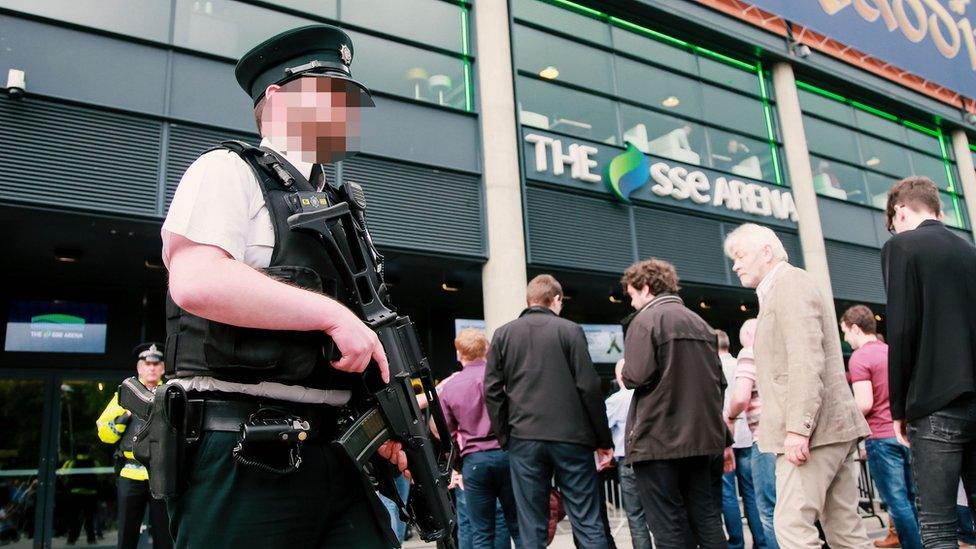
Police would do all they could to keep people safe, said PSNI Chief Constable George Hamilton
Mr Hamilton said that some parts of the UK were "more vulnerable and susceptible than others" but added Northern Ireland already had specialist firearms officers in place because of the specific threat from dissidents.
"Unfortunately in Northern Ireland, we have had the threat level at severe in relation to the threat level emanating from violent dissident republicans," Mr Hamilton said.
"So, the movement for us from severe to critical to do with this Jihadist extremist threat is less of a gearing up than it would be in other parts of the UK."

Analysis - BBC News NI home affairs correspondent Vincent Kearney
Mr Hamilton said he could ask for military support, but did not feel it is needed.
He explained that his officers were used to dealing with a threat level from dissident republican paramilitaries which has been assessed as "severe" for the past eight years.
The severe threat means an attack is considered "highly likely" and is only one level below the "critical" assessment issued by the government following the Manchester attack.
The chief constable insisted his decision not to deploy soldiers is for operational reasons, and not because of any political pressure not to do so.

Mr Hamilton said the PSNI had very well equipped and trained officers and was "fortunate" in terms of its security resources.
"We get an additional security fund of around £60m per year to allow us to deal with the severe threat emanating from violent dissident republicans," he told reporters
"Every officer, unfortunately, in this jurisdiction has to carry a firearm.
"These are assets that we don't like to have but actually at a time like this, of a critical threat, it becomes a valuable asset that some of our colleagues in other parts of the UK don't have."
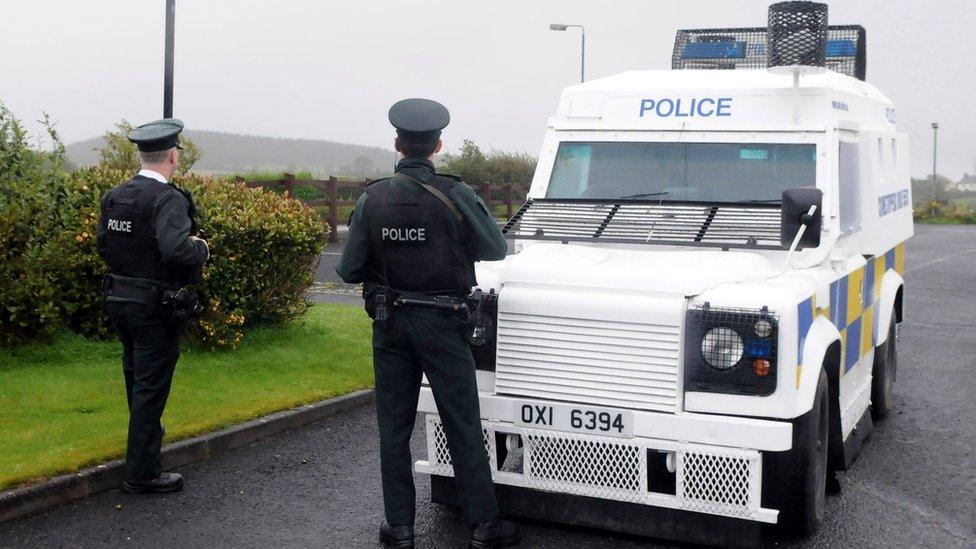
PSNI officers are all routinely armed, unlike other UK police forces
When asked if he was under any direct or implied pressure not to ask for military assistance - in case doing so would annoy Sinn Féin', the SDLP and the Irish government - the chief constable replied: "None whatsoever."
"I don't think I've ever come across as having been fettered by political commentary or political consequence, and I'm certainly not fettered in asking for military support if I need it."
Mr Hamilton said deploying troops under the current circumstances would be "disproportionate" and "unnecessary".
"There is absolutely no requirement and I'm quite satisfied that we can mitigate the risk as it currently stands with the policing resources that I have available to me."
The PSNI says the threat level will be kept under constant review.
After the attack, Northern Ireland's political parties suspended their election campaigns as a mark of respect to the victims, and vigils were held in Belfast and Londonderry.
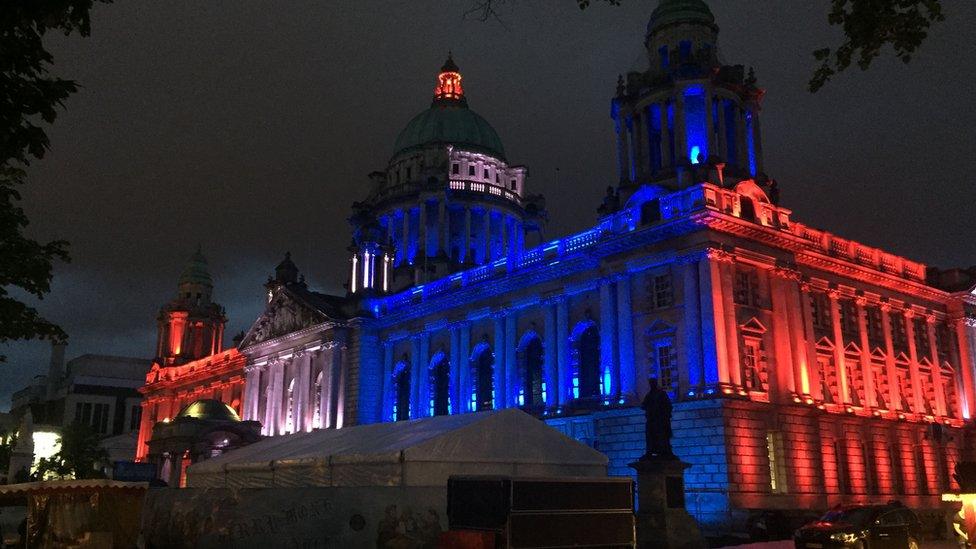
Belfast City Hall was illuminated in the colours of the Union flag after Monday's attack in Manchester
The first televised general election debate involving Northern Ireland's political parties, scheduled for Wednesday, has been postponed.
Meanwhile, at Belfast's SSE Arena, extra security was introduced for a show on Tuesday night featuring Professor Brian Cox.
'We share your pain'
On Tuesday night, Belfast City Hall was lit up in the colours of the Union Flag in solidarity with Manchester.
Earlier, some 40 people assembled at Derry's war memorial for a candlelit vigil to honour the dead.
Members of the city's Muslim community joined the vigil and addressed the crowd.
Trade union members, students, families, and community organisations were also there to show their support.
Anna McAree, an 18-year-old from Derry, said they wanted to show their support and defiance.
"It could have been me or my friends, it could have happened to anyone anywhere, so it's really important to show solidarity to the families and those affected today," she said.
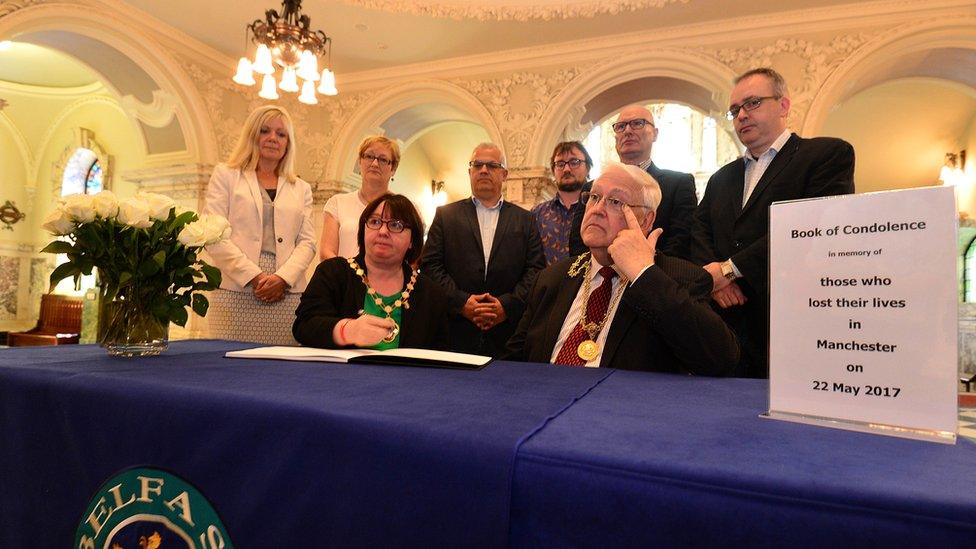
A book of condolence was opened at Belfast City Hall for the victims of the attack
Amnesty International director in Northern Ireland Patrick Corrigan said the vigil at Belfast City Hall was "really a spontaneous response by members of the local community and really it is an opportunity to stand in solidarity with the citizens of Manchester from the citizens of Belfast".
"To say we share your pain, and it is a response that is about a sense of community, a sense of humanity and the simple message tonight is, we stand together," he added.
- Published24 May 2017
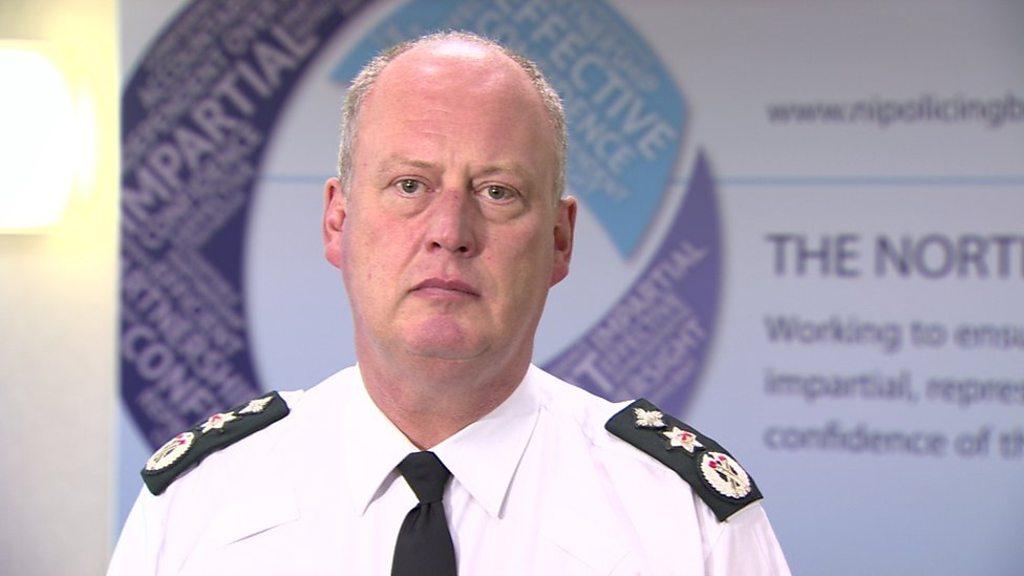
- Published23 May 2017
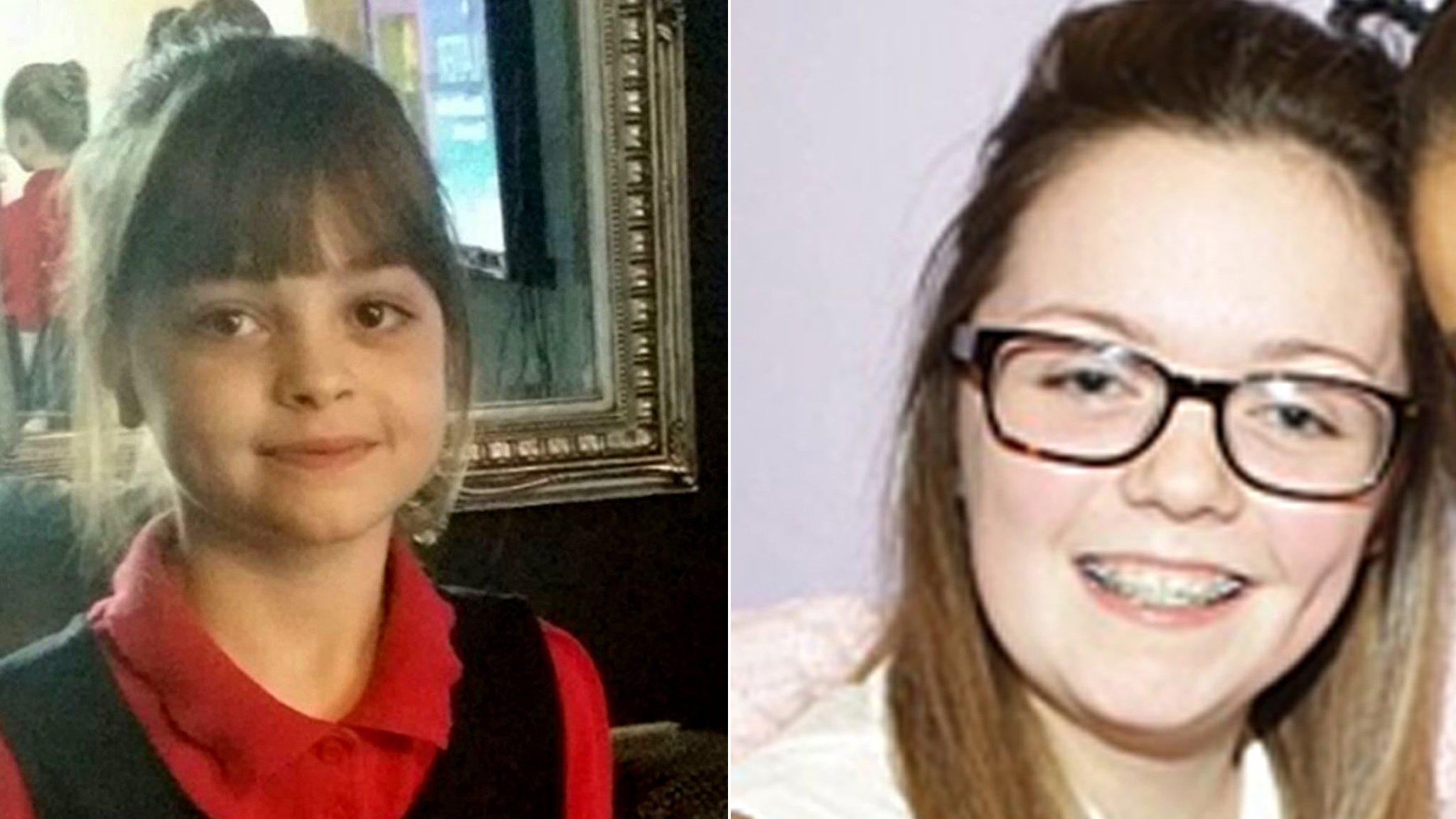
- Published23 May 2017
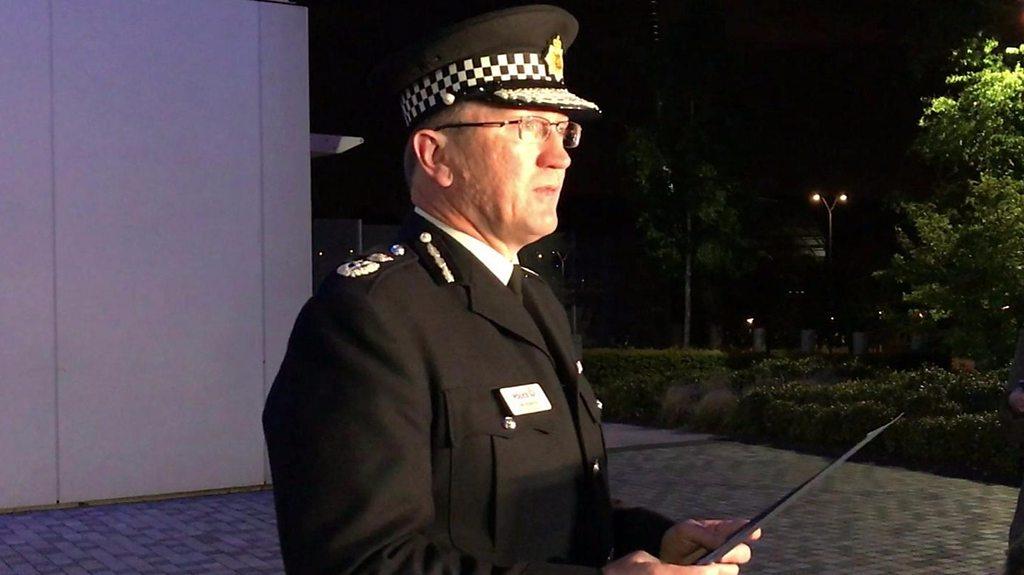
- Published23 May 2017
